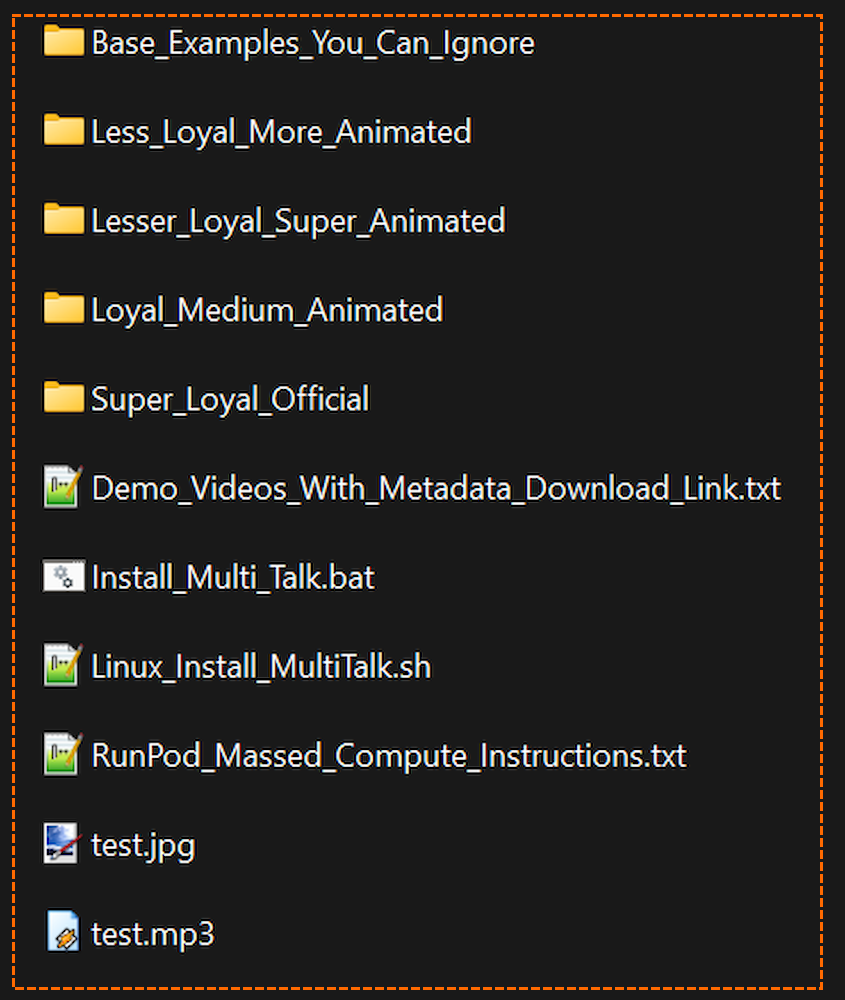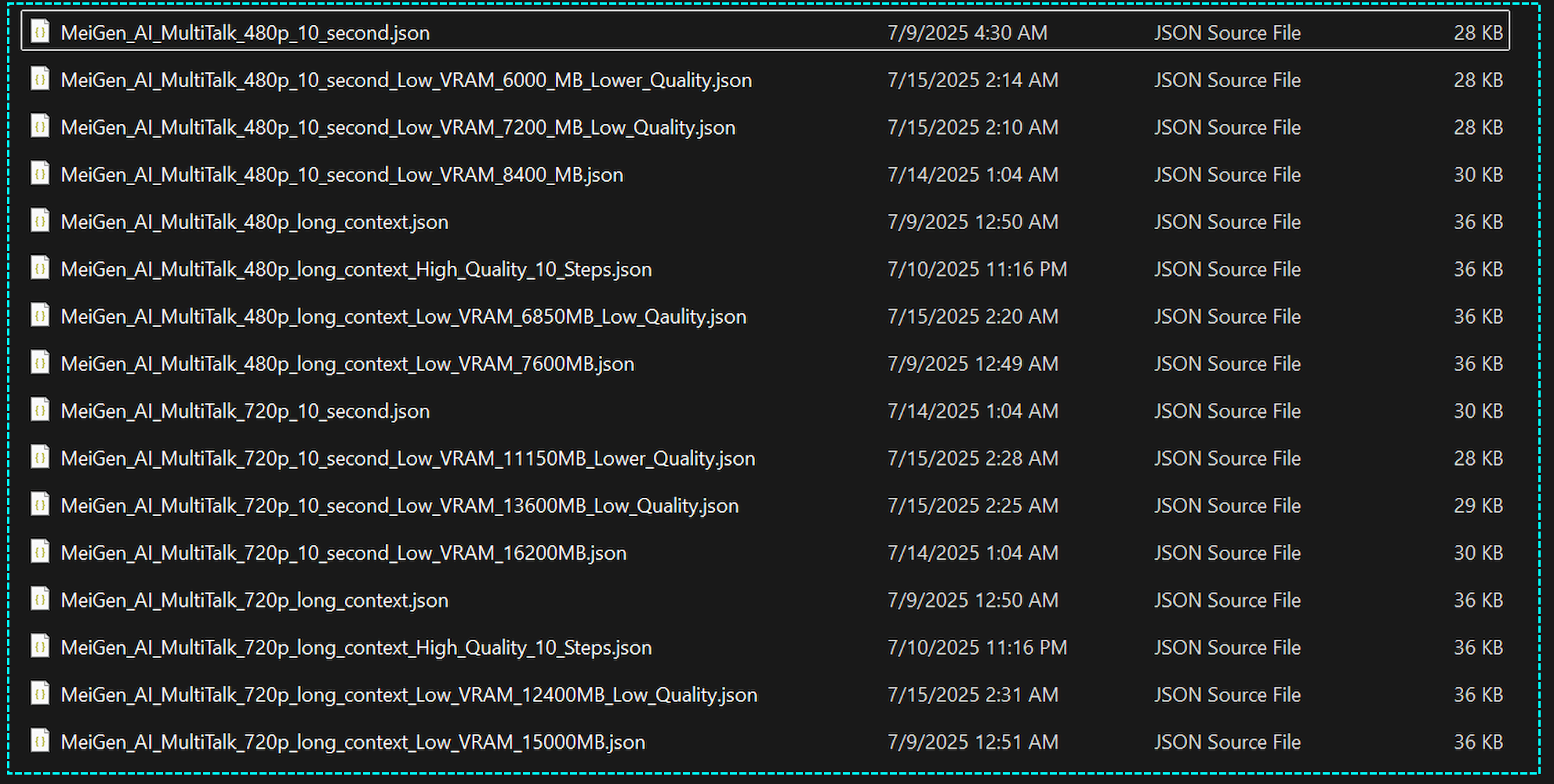MultiTalk Levelled Up - Way Better Animation Compared to Before with New Workflows - Image to Video
MultiTalk is greatly upgraded. After doing more than 1 day more research with MultiTalk by using 8x A6000 48 GB GPUs, I have significantly improved the MultiTalk workflows and now I am sharing 4 different category workflows with you. VRAM usages and speeds are same but just better quality and animation. Moreover I am introducing a new app which is image and video comparison sliders. Ultra fast and lightweight. Runs as a html app and no GPU is required.
🔗 Newest tutorial ⤵️
▶️ https://youtu.be/wgCtUeog41g

🔗 Main Tutorial That You Have To Watch ⤵️
▶️ https://youtu.be/8cMIwS9qo4M

🔗Follow below link to download the zip file that contains MultiTalk bundle downloader Gradio App — the one used in the tutorial ⤵️
▶️ https://www.patreon.com/posts/SwarmUI-Installer-AI-Videos-Downloader-114517862
🔗Follow below link to download the zip file that contains ComfyUI 1-click installer and the WORKFLOW shown in tutorial that has all the Flash Attention, Sage Attention, xFormers, Triton, DeepSpeed, RTX 5000 series support ⤵️
▶️ https://www.patreon.com/posts/Advanced-ComfyUI-1-Click-Installer-105023709
🔗Follow below link to download the zip file that contains Image and Video Comparison Slider App⤵️
▶️ https://www.patreon.com/posts/Image-Video-Comparison-Slider-App-133935178
🔗 Python, Git, CUDA, C++, FFMPEG, MSVC installation tutorial — needed for ComfyUI ⤵️
▶️ https://youtu.be/DrhUHnYfwC0
🔗 SECourses Official Discord 10500+ Members ⤵️
▶️ https://discord.com/servers/software-engineering-courses-secourses-772774097734074388
🔗 Stable Diffusion, FLUX, Generative AI Tutorials and Resources GitHub ⤵️
▶️ https://github.com/FurkanGozukara/Stable-Diffusion
🔗 SECourses Official Reddit — Stay Subscribed To Learn All The News and More ⤵️
▶️ https://www.reddit.com/r/SECourses/
I am currently looking for video to video lip synching workflow with MultiTalk
Updated Workflows
We have 4 different level of animation and loyalty
Each Folder has the following workflows including lower VRAM GPUs
Video Chapters (MultiTalk Levelled Up — Way Better Animation Compared to Before with New Workflows — Image to Video) : https://youtu.be/wgCtUeog41g
- 0:00 Introduction to the MultiTalk Tutorial
- 0:12 One-Click ComfyUI and MultiTalk Installation
- 0:29 Demonstration of MultiTalk’s Singing Animation Capabilities
- 0:58 VRAM Requirements and Workflow Optimizations
- 1:12 Overview of the Tutorial Content
- 1:35 Improvements and New Workflow Options
- 1:52 How to Update and Use the New SwarmUI and MultiTalk Bundle
- 2:24 Exploring the New Workflow Presets in ComfyUI
- 3:08 Downloading and Using the Demo Videos with Embedded Workflows
- 3:36 Introduction to the New Video and Image Comparison Application
- 4:00 How to Use the Image Comparison Tool
- 4:33 How to Use the Video Comparison Tool
- 5:24 Advanced Upscaling and Comparison Demonstration
- 6:11 Final Remarks and Where to Find Installation Instructions
Video Chapters (MultiTalk Full Tutorial With 1-Click Installer — Make Talking and Singing Videos From Static Images) : https://youtu.be/8cMIwS9qo4M
By using MeiGen MultiTalk you can generate amazing fully animated real-like videos from given audio input. Not only talking but also animating the body movements is possible. In this video I will show you how to install ComfyUI on Windows and MultiTalk bundle and workflows we prepared with 1-click. Then I will show how to very easily generated amazing videos from these installed workflows. Moreover, I will show our favorite cloud private GPU provider Massed Compute. How to install same there and use it properly. Finally I will show everything on RunPod as well. So whether you are GPU poor or have good GPU, this tutorial covers everything.
- 0:00 Intro & MultiTalk Showcase
- 0:28 Singing Animation Showcase
- 0:57 Tutorial Structure Overview (Windows, Massed Compute, RunPod)
- 1:10 Windows — Step 1: Download & Extract the Main ZIP File
- 1:43 Windows — Prerequisites (Python, Git, CUDA, FFmpeg)
- 2:12 Windows — How to Perform a Fresh Installation (Deleting venv & custom_nodes)
- 2:42 Windows — Step 2: Running the Main ComfyUI Installer Script
- 4:24 Windows — Step 3: Installing MultiTalk Nodes & Dependencies
- 5:05 Windows — Step 4: Downloading Models with the Unified Downloader
- 6:18 Windows — Tip: Setting Custom Model Paths in ComfyUI
- 7:18 Windows — Step 5: Updating ComfyUI to the Latest Version
- 7:39 Windows — Step 6: Launching ComfyUI
- 7:53 Workflow Usage — Using the 480p 10-Second Workflow
- 8:07 Workflow Usage — Configuring Basic Parameters (Image, Audio, Resolution)
- 8:55 Workflow Usage — Optimizing Performance: ‘Blocks to Swap’ & GPU Monitoring
- 9:49 Workflow Usage — Crucial Step: Calculating & Setting the Number of Frames
- 10:48 Workflow Usage — First Generation: Running the 480p Workflow
- 12:01 Workflow Usage — Troubleshooting: How to Fix ‘Out of VRAM’ Errors
- 13:51 Workflow Usage — Introducing the High-Quality Long Context Workflow (720p)
- 14:09 Workflow Usage — Configuring the 720p 10-Step High-Quality Workflow
- 16:18 Workflow Usage — Selecting the Correct Model (GGUF) & Attention Mechanism
- 17:58 Workflow Usage — Improving Results by Changing the Seed
- 18:36 Workflow Usage — Side-by-Side Comparison: 480p vs 720p High-Quality
- 20:26 Workflow Usage — Behind the Scenes: How the Intro Videos Were Made
- 21:32 Part 2: Massed Compute Cloud GPU Tutorial
- 22:03 Massed Compute — Deploying a GPU Instance (H100)
- 23:40 Massed Compute — Setting Up the ThinLinc Client & Shared Folder
- 25:07 Massed Compute — Connecting to the Remote Machine via ThinLinc
- 26:06 Massed Compute — Transferring Files to the Instance
- 27:04 Massed Compute — Step 1: Installing ComfyUI
- 27:39 Massed Compute — Step 2: Installing MultiTalk Nodes
- 28:11 Massed Compute — Step 3: Downloading Models with Ultra-Fast Speed
- 30:22 Massed Compute — Step 4: Launching ComfyUI & First Generation
- 32:45 Massed Compute — Accessing the Remote ComfyUI from Your Local Browser
- 35:07 Massed Compute — Downloading Generated Videos to Your Local Computer
- 36:08 Massed Compute — Advanced: Integrating with the Pre-installed SwarmUI
- 38:06 Massed Compute — Crucial: How to Stop Billing by Deleting the Instance
- 38:33 Part 3: RunPod Cloud GPU Tutorial
- 39:29 RunPod — Deploying a Pod (Template, Disk Size, Ports)
- 40:39 RunPod — Connecting via JupyterLab & Uploading Files
- 41:11 RunPod — Step 1: Installing ComfyUI
- 42:32 RunPod — Step 2: Downloading Models
- 45:26 RunPod — Step 3: Installing MultiTalk Nodes
- 45:52 RunPod — Step 4: Launching ComfyUI & Connecting via Browser
- 47:50 RunPod — Running the High-Quality Workflow on the GPU
- 51:11 RunPod — Understanding the Generation Process on a High-VRAM GPU
- 52:34 RunPod — Downloading the Final Video to Your Local Machine
- 53:04 RunPod — How to Stop & Restart a Pod to Save Costs
MultiTalk: Bringing Avatars to Life with Lip-Sync
Complementing WAN 2.1 is MultiTalk, a specialized model for generating talking avatars from images and text or audio inputs. Available on platforms like fal.ai, it offers variants such as single-text for solo avatars, multi-text for conversations, and audio-based syncing. By converting text to speech and ensuring natural lip movements, MultiTalk addresses a key challenge in AI video: realistic dialogue delivery.
When paired with WAN 2.1 in ComfyUI workflows, MultiTalk achieves Veo 3-level lip-sync, enabling local AI video projects with enhanced expressiveness. This integration has been hailed for solving lip-sync issues that plagued earlier models, allowing creators to produce dynamic talking-head videos from static portraits. For instance, workflows turn three images into videos in minutes, ideal for animations or virtual influencers.


